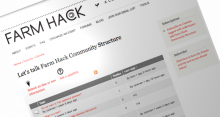Food Solutions New England (FSNE) is a regional food systems learning-action network dedicated to advancing a sustainable New England food system. The FSNE network is organized around four interrelated activities:
A New England Food Vision, a bold vision that calls for our region to build the capacity to produce up to 70% of food that is produced in an environmentally and socially sustainable manner, that promotes health and is accessible by all New Englanders by 2060; New England state food planning initiatives; annual New England food summits and topical workshops; and related analysis, communication and visualization.
The UNH Sustainability Institute serves as the backbone organization for FSNE. Since its inception in 2006, FSNE has advanced its mission by linking a common agenda, shared measurement, continuous communication, and synergestic activities.



I think this is why this community is so important - to prioritize and help folks along to gather more of the skills which would otherwise keep them dependent or reduce possibilities for innovation. I think that is why "hacker spaces" are popping up that enable access to more tools, some of which are not needed every day, but make a job from being a struggle to a pleasure. There are several farms in our area that rent out space to equipment shops, so that they have quick access. Our farm does work for our own operation and a couple others, so there are a lot of models towards shared ownership/access and scale that justifies the infrastructure. Some of the approaches are to reduce the cost of the tools to accomplish the task, or to save folks from investing in tools that are less important - and that is where feedback is especially important based on what folks are actually using.
For example, there was a guy at a recent Farm Hack event who had a hand held metal circular saw that he thought was the best thing going - I had looked at them and the price always kept me away, but he made a great case for it. He didn't have the tank rental fees, gas etc. and hardly touched his torch or even the plasma cutter. In two years of my tank rentals I think I probably could have paid for it.
I also just talked with a group of farmers and they just got a TIG just so they could work on their aluminum irrigation piping. I have not made the investment myself, on the tig or the mill yet, as I can't justify it just for our operation yet, but I have been talking about sharing the shop with some other folks and adding those things in. As our operation diversifies and grows the shop becomes more important. Since we serve three farms and have a good deal of cooperative relationships I think that is what makes it possible to invest in some of this- but not all at once. I know I have a bunch of stainless tanks that I will need in the next year or so, and that may push a TIG - but even then it may be a shared investment. The mill will be a similar story . There always seem to be several in the $3000 range around here - as you mention the skill is the big factor. In this case wouldn't invest alone, but with a machinest friend of mine who is doing custom work who might co-locate. He wouldn't need it every day either. I provide the space, he provides expertise and it is conveniently available when it is needed- but for both of us the upcoming projects need to justify the space, the time and the expense.
Ideally I would like to see farmhack help link up the services you mention with farmers through the tools pages. If done well, the documentation is good enough to take it to a custom shop, or if the skills and tools are there on-farm then all the better. Some of the tools don't need to be owned but I think farm hackers should know what is possible and how to access tools. I see it as helping each other breaking down barriers, reduce the intimidation factor for some of these skills and become more independent through greater collaboration.